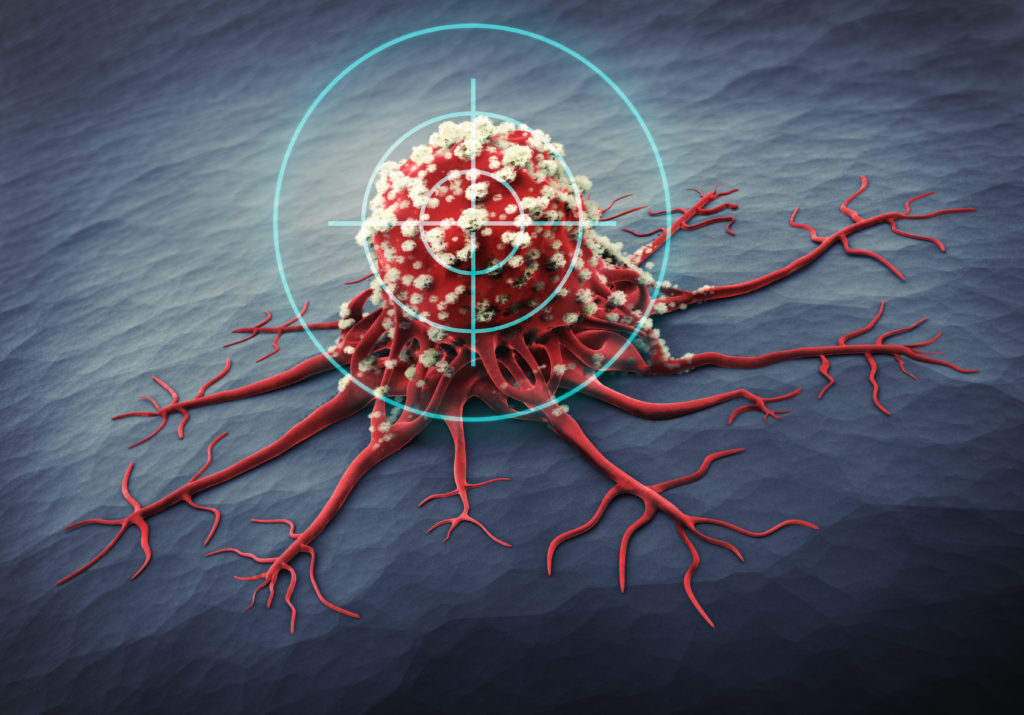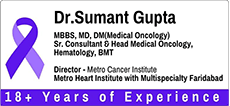Targeted Therapy: How Does It Fight Cancer Cells?

Targeted therapy is a type of cancer treatment that uses drugs designed to “target” cancer cells without affecting normal cells. This treatment can influence the tissue environment where cancer cells develop or target cells directly involved in cancer growth, such as blood vessel cells.
It’s effective for various types of cancer and can be combined with other treatments like chemotherapy. Compared to chemotherapy, which succeeds around 30% of the time, targeted therapy achieves up to 80% success rates. While not all cancers have targeted therapies, ongoing research expands the range of available treatments.
This article will help you understand how targeted therapy works to treat cancer.
What is Targeted Therapy?
Targeted therapy is a type of cancer treatment that targets proteins that control how cancer cells grow, divide, and spread. It is the foundation of precision medicine. As researchers learn more about the DNA changes and proteins that drive cancer, they can better design treatments that target these proteins.
Dr. Sumant Gupta, a renowned Medical Oncologist, specializes in targeted therapy for cancer. With extensive experience in this field, Dr. Gupta has helped numerous patients benefit from precision treatments that target specific genes and proteins in cancer cells. His expertise and dedication make him a trusted expert in delivering effective targeted therapy, improving outcomes for cancer patients.
What Are The Types Of Targeted Therapy?
The table below outlines the types of targeted therapy used in cancer treatment:
| Type of Targeted Therapy | Description |
| Monoclonal Antibodies | Antibodies are designed to target specific proteins in cancer cells, tagging them for destruction by the immune system. |
| Tyrosine Kinase Inhibitors | Drugs that block signals needed for cancer cell growth are often used for cancers with specific genetic mutations. |
| Hormone Therapies | Drugs that interfere with hormone production or activity are commonly used for hormone-sensitive cancers like breast or prostate cancer. |
| Angiogenesis Inhibitors | Drugs that block the formation of new blood vessels cut off the blood supply to tumors and slow their growth. |
| PARP Inhibitors | Drugs that inhibit PARP enzymes prevent cancer cells from repairing their DNA and leading to cell death. |
These therapies are often used in combination with other cancer treatments, such as chemotherapy or radiation therapy, to improve outcomes and reduce side effects.
Dr. Sumant Gupta: “Targeted therapies are personalized based on the unique characteristics of a patient’s cancer. This includes factors like specific genetic mutations or proteins in the cancer cells. By identifying these traits, we can match patients with treatments most likely effective for their particular type of cancer, maximizing the benefits of targeted therapy.”
How Does Targeted Therapy Work Against Cancer?
The following explains the different ways that targeted therapy treats cancer.
- Help the immune system destroy cancer cells: Cancer cells thrive because they can hide from your immune system. Specific targeted therapies can mark cancer cells, making it easier for the immune system to find and destroy them. Other targeted therapies help boost your immune system to work better against cancer. Learn more about immunotherapy to treat cancer.
- Stop cancer cells from growing by interrupting signals that cause them to expand and divide: Healthy cells in your body usually divide to make new cells only when they receive strong signals. These signals bind to proteins on the cell surface, telling the cells to divide. This process helps new cells form only as your body needs them. However, some cancer cells have changes in the proteins on their surface that tell them to divide whether or not signals are present. Some targeted therapies interfere with these proteins, preventing them from telling the cells to divide. This process helps slow cancer’s uncontrolled growth.
- Stop signals that help form blood vessels: To grow beyond a specific size, tumors must form new blood vessels in an angiogenesis process. The tumor sends signals that start angiogenesis. Some targeted therapies called angiogenesis inhibitors interfere with these signals to prevent a blood supply from forming. Without a blood supply, tumors stay small. Or, if a tumor already has a blood supply, these treatments can cause blood vessels to die, which causes the cancer to shrink. Learn more about angiogenesis inhibitors.
- Deliver cell-killing substances to cancer cells: Some monoclonal antibodies are combined with cell-killing substances such as toxins, chemotherapy drugs, or radiation. Once these monoclonal antibodies attach to targets on the surface of cancer cells, the cells take up the cell-killing substances, causing them to die. Cells that don’t have the target will not be harmed.
- Cause cancer cell death: Healthy cells die in an orderly manner when they become damaged or are no longer needed. But cancer cells have ways of avoiding this dying process. Some targeted therapies can cause cancer cells to go through this cell death process called apoptosis.
- Starve cancer of hormones it needs to grow: Some breast and prostate cancers require certain hormones to grow. Hormone therapies are a type of targeted therapy that can work in two ways. Some hormone therapies prevent your body from making specific hormones. Others stop the hormones from acting on your cells, including cancer cells. Learn more about hormone therapy for prostate cancer and hormone therapy for breast cancer.
“Unlike traditional chemotherapy, targeted therapy is more precise, targeting specific aspects of cancer cells. It can impact the tissue environment by inhibiting factors that promote cancer growth.” – says Dr Gupta.
“I was skeptical about targeted therapy at first, but Dr. Sumant Gupta explained everything so clearly and made me feel confident in my treatment plan. The personalized approach made a difference, and I’m grateful for the positive outcome.” – a satisfied patient of Dr. Gupta.
“I had been struggling with side effects from chemotherapy, but targeted therapy offered a more precise and effective option. Dr. Gupta’s expertise and the tailored treatment plan have significantly improved my quality of life. I highly recommend considering targeted therapy for cancer treatment.” – another pleased patient.
How Much Does Cancer Targeted Therapy Cost In India?
| Targeted Therapy | Cost in INR | Cost in USD (Approx.) |
| Trastuzumab (Herceptin) | ₹75,000 – ₹1,00,000 per vial | $1,000 – $1,350 per vial |
| Bevacizumab (Avastin) | ₹25,000 – ₹35,000 per vial | $335 – $470 per vial |
| Rituximab | ₹15,000 – ₹25,000 per vial | $200 – $335 per vial |
| Imatinib (Gleevec) | ₹8,000 – ₹10,000 per month | $110 – $135 per month |
Please note that these costs are approximate and vary based on the dosage, brand, and hospital or clinic. It’s advisable to consult with a healthcare provider or pharmacist for the most accurate and up-to-date pricing information.
Conclusion
Targeted therapy is like using a smart missile to attack cancer cells, leaving healthy cells unharmed. It’s a precise approach that has improved outcomes for many patients. While it’s not a cure-all, and some challenges remain, like the risk of resistance, it’s a significant step forward in cancer treatment. As research continues, we can expect even more progress in fighting cancer with targeted therapy, giving hope to those battling this disease.
FAQs about Targeted Therapy
-
Can targeted therapy be used alone to treat cancer?
Targeted therapy is often used in combination with other treatments like chemotherapy or radiation therapy to improve outcomes.
-
Are there side effects of targeted therapy?
Yes, common side effects include diarrhea, skin problems, and high blood pressure, but they can vary depending on the specific therapy.
-
Is targeted therapy a one-size-fits-all approach?
No, targeted therapy is tailored to the specific genetic makeup of an individual’s cancer cells.
-
How is targeted therapy different from traditional chemotherapy?
Targeted therapy specifically targets cancer cells, while chemotherapy affects all rapidly dividing cells, including healthy ones.
-
Can targeted therapy fully cure cancer?
While targeted therapy can be highly effective, it’s not always a cure. It can help control cancer and improve quality of life.
Read More : What Are The Various Cancer Screening Options?
